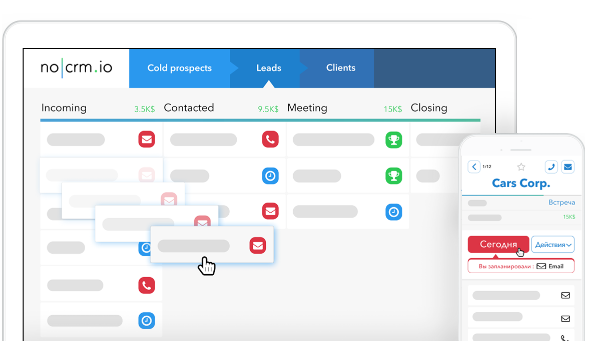
What is the closing of a sale?
The closing is the last step in the sales process, when the prospect makes the decision to invest in the product. It is a key step in the process, joining both parties in a contract. The contract will create obligations between the sales team and the buyer.
There’s a common conception of the successful salesperson: a ruthless, dishonest business person ready to sell their product at any cost. The salesperson is thus seen as interested in their own profits, not the needs of the buyer. The article will explain how to avoid these sales practices, so as to create honest relationships with buyers.
Closing a sale, a key step in the sales process
A good salesperson sells a product or service to a client that caters to their needs. With the internet, potential clients are now able to enquire about products. This means that sales must be suited to the prospect’s needs.
The closing, then, must be the fruit of an honest relationship between buyer and seller, in which the buyer is well aware of what they are investing in.
Preparing a sales closing in advance
If negotiation does not end as predicted, many assume that the last step was solely to blame. In reality, however, an unsuccessful sale is often caused by problems throughout the entire sales process.
Closing a sale is the conclusion of an entire process, and must be preceded by a series of fundamental steps:
- Prospect identification: Is the client your target demographic in terms of industry, the size of the company, and location?
- Who are you talking to? What is their job, and do they have the ability to make decisions?
- Understanding a prospect’s needs: What are their needs and goals?
- Identifying potential obstacles: Are there internal problems in their company? Are they interested in your competitors?
- Analysing your prospect’s budget: The company’s annual turnover, as well as their costs, factor largely in your prospect’s decision-making.
Being aware of these factors will help you anticipate potential obstacles, so as to better deal with them. You will also be able to prioritise bigger-budget deals.
Your sales team will adapt their prospecting to the needs and resources of the prospects. A good salesperson has to listen to the prospect, so as to provide an offer with the highest value to future clients.
Multiple methods have been developed to encourage prospects to close a deal. It is vital to make them confident about the deal, by asking them about their potential apprehensions. A sales team can also seek help from larger professional bodies.
Closing a sale is all about timing
Do not rush the prospect
Trust is key in determining client loyalty and repeated purchases. Although fundamental, the relationship with a client is often one of the trickiest aspects of the sales process.
In order to build trust, you should create an atmosphere of mutual respect by really listening to the client. Take the time to listen to them throughout the entire process, whilst remaining aware of your deadlines.
It is recommended that you set up your next sales steps to keep the conversation going. You should have goals in mind at each step, without forgetting that creating trust is your priority.
Do not waste time with the prospect
The sales team is not the customer support team, they are not there to answer all the prospect’s questions. You have to follow efficient deadlines without rushing the client. The sales team must remain focused to not deal with vague needs from the client. By and large, a sale is when the needs of the buyer and seller converge.
Also, don’t hesitate to push the prospect when discussions are taking too long. It is sometimes best to let the prospect know when they should make a decision, so as to avoid wasting time and money.
What is preventing you from closing the deal?
Competition can be your worst enemy when it comes to closing deals. You should be aware of what your competitors are offering, so as to best highlight the pros and cons of their product. It is best to underline the differences between their product and yours, thus clearly positioning yourself in the market. Avoid undermining your competitors.
You may also face issues in setting up the product. Some projects are unsuccessful due to internal issues on the prospect’s side, such as fear of change.
Always put yourself in the prospect’s position to understand what is bothering them. If they have an issue with the price, think about offering a reduction. The perfect price is slightly too expensive for the prospect, but still leads to them closing the deal.
Various closing methods
When closing a deal, the salesperson should have a psychological approach:
- Be comfortable with the prospect to show that you trust your own product.
- Avoid saying that your product is too expensive. Quite often, young salespeople perceive certain products to be too expensive, forgetting the added value they bring to the client. The price does not solely represent production costs, but also client benefits.
- Be empathetic when facing issues, by going over the points agreed on and finding what is blocking the client. This is so that the client “closes” the deal themselves.
- Focus on the biggest issue rather than all the client’s issues. No deal is perfect, so the best deal tries to resolve the most pressing issue.
A “no” is not always definitive
Understand why the prospect has refused the deal. Figure out whether the client is simply not interested or looking to be convinced.
Show the client you understand why they have refused and that you respect their decision. Bear in mind that many prospects are open to a counter-offer. The more adapted you are to the needs of the prospect, the more likely they are to accept your offer.
Being equipped for the sales process
To help you with the sales process, noCRM will guide you, showing which step you have to complete next. There are also many tools to help you close:
- A sales script to better qualify your prospects
- Waalaxy to contact prospects on LinkedIn
- Kaspr to find their contact details
- Quickbooks to prepare quotes
Well-equipped, you will be able to maximise your chances of closing deals with leads.
To conclude, closing is all about timing and trust, it’s the conclusion of a client-seller relationship built over the course of the sales process.
A good closing happens at the right moment so that the deal can be signed without effort. It is thus essential to:
- Talk to the right person
- Evaluate the needs of the prospect and identify the biggest issue that needs solving
- Define the solution with the prospect
- Listen closely to the prospect and guide them up until closing the sale.
With all this in place, the deal is ready to be signed.
Frequently asked questions
You should prepare closing in advance, and respect certain steps so as to develop trust between you and the client.
The salesperson must know their target market and change their approach according to the needs of the prospect.
The main reason is that the salesperson did not properly evaluate the needs of the prospect before closing. They were unable to create a relationship built on trust with the client.


